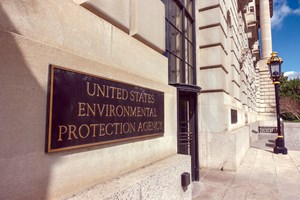New Jersey to replace 5,400 lead services lines in $48 million drinking water infrastructure investment
(WO) – In a significant investment to improve water infrastructure in New Jersey, the U.S. Environmental Protection Agency Regional Administrator Lisa F. Garcia, Shawn LaTourette, Commissioner of the New Jersey Department of Environmental Protection and other dignitaries’ broke ground for a major upgrade to the drinking water system serving the Township of Irvington, NJ.

The $48 million upgrade, funded by the Biden-Harris Administration’s Bipartisan Infrastructure Law, will include replacing approximately 5,400 lead service lines within the Township’s water service area of the Passaic Water System over the next three to five years.
EPA has awarded total of $254 million to New Jersey in the first three years of the five-year Bipartisan Infrastructure Law (BIL) Drinking Water State Revolving Fund Lead Service Line Replacement (LSLR) Program Capitalization Grant Program. These funds will support projects under a state-wide ten-year implementation plan, with a primary focus on disadvantaged communities.
“This project is a perfect example of the historic federal Bipartisan Infrastructure Law providing vital funds to New Jersey to ensure that our communities, and especially our children, have safe and lead-free drinking water,” said Regional Administrator Lisa F. Garcia.
“EPA is happy to partner with NJ as we prioritize getting the lead out. There is no safe level of lead exposure, and we know that the primary source of harmful exposure in drinking water is through lead pipes.”
“Safe and reliable water infrastructure is critical to the vitality of our communities,” NJDEP Commissioner Shawn LaTourette said. “This record-setting, billion-dollar investment in our water infrastructure throughout the state demonstrates the high level of commitment that our local governments and water systems are making to protect public health and the environment.”
President Biden’s Bipartisan Infrastructure Law invests $15 billion to identify and replace lead service lines. The law mandates that 49% of funds provided through the DWSRF General Supplemental Funding and DWSRF Lead Service Line Replacement Funding must be provided as grants and forgivable loans to disadvantaged communities, a crucial investment for communities that have been underinvested in for too long.
EPA projects a national total of 9 million lead services lines across the country, based on data collected from the updated 7th Drinking Water Infrastructure Needs Survey and Assessment. The funding will be provided specifically for lead service line identification and replacement and will help New Jersey fund projects to remove lead pipes and reduce exposure to lead from drinking water.
This Lead Service Line-specific formula allows states to receive financial assistance commensurate with their need as soon as possible, furthering public health protection nationwide.
To ensure that funding is used for lead service line related activities, LSLR allotments are based on need — meaning that states with more projected lead service lines receive proportionally more.
New Jersey American Water provides water service to 34 municipalities across Essex, Union, Morris, Somerset, and Hunterdon Counties. The Passaic Water System delivers approximately 34.0 million gallons per day (MGD) of potable water to around 79,860 customers and serves approximately 84,000 service connections within its franchise areas.
Lead can enter drinking water when plumbing materials that contain lead corrode, especially where the water has high acidity or low mineral content that corrodes pipes and fixtures.
The most common sources of lead in drinking water are lead pipes, faucets, and fixtures. In homes with lead pipes that connect the home to the water main, also known as lead services lines, these pipes are typically the most significant source of lead in the water.
Lead pipes are more likely to be found in older cities and homes built before 1986. Among homes without lead service lines, the most common problem is with brass or chrome-plated brass faucets and plumbing with lead solder.
Related News
From Archive

- Glenfarne Alaska LNG targets late-2026 construction start for 807-mile pipeline project
- U.S. water reuse boom to fuel $47 billion in infrastructure spending through 2035
- $2.3 billion approved to construct 236-mile Texas-to-Gulf gas pipeline
- Major water pipe break in Puerto Rico hits over 165,000 customers
- Potomac River Tunnel project enters construction phase beneath Washington, D.C.
- Pennsylvania American Water launches interactive map to identify, replace lead water service lines
- Trump's tariffs drive $33 million cost increase for Cincinnati sewer project
- Utah city launches historic $70 million tunnel project using box jacking under active rail line
- Tulsa residents warned after sewer lines damaged by boring work
- Fatal trench collapse halts sewer construction in Massachusetts; two workers hospitalized



Comments